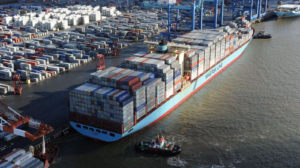
Rolf Habben Jansen (CEO of Hapag-Lloyd AG) Photo credit: Hapag-Lloyd
Similar to other container carriers that have shown the same pattern so far during the first quarter of 2023 with reduced revenues and profit, Hapag-Lloyd books profit below the prior-year level.
Hapag-Lloyd blames the weakening demand as profits and revenues have declined. The decline in the average freight rate as well as the decrease in the transport volume compared to the prior year period hit the German carrier.
According to a statement on the quarterly report, the Group´s profit was below the prior-year level, at $2 billion in the first three months of the year, while transport volumes were 4.9% lower than in the first quarter of last year, owing to local destocking and weaker overall global demand.
Germany’s Hapag-Lloyd saw a decrease in the profits and revenues as the weak global demand has continued in the first quarter of 2023.
Revenues dropped by €2,357.5 million to €5,619.0 million in comparison with the prior year period of €7,976.6 million, a decrease of 29.6%. “This was mainly due to a decrease in the average freight rate by 27.9% as well as a decrease in the transport volume by 4.9% compared to the prior year period,” as said by the company.
“Despite declining results, we have made a robust start to the current financial year. The market environment has normalised, with corresponding declines in demand and freight rates. This will undoubtedly have an impact on our earnings over the course of the year, so we will be keeping a very close eye on our costs. In addition, we are pressing ahead on further developing our Group’s ‘Strategy 2030’, which will focus on quality and sustainability,” said Rolf Habben Jansen, CEO of Hapag-Lloyd AG.
The top management expects demand for container transport to recover only slowly in fiscal year 2023 due to inflation, with a significant increase in the supply of container shipping capacity.
For these reasons, the remaining fiscal year 2023 is classified as challenging.
Hapag-Lloyd predicts that the ongoing war in Ukraine and other geopolitical conflicts, as well as the effects of high inflation, mean that the further course of business is subject to high uncertainties.



